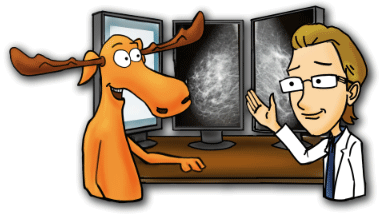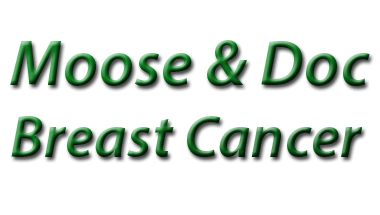Risk Factors for Breast Cancer: Section 1.c.
CONTENTS:
1.11 Other Risk Factors for Breast Cancer
1.11.1 Breast Density: Major risk factors for breast cancer
1.11.2 Naturally Occurring Hormones
1.11.3 Hormone Replacement Therapy (HRT)
1.11.4 Alcohol Consumption
1.11.5 Obesity
1.12 Male Breast Cancer
Forward to 2A on Screening mammography. Back to 1B on screening results
1.11 Other Risk Factors for Breast Cancer
Traditional measures of breast cancer risk include family history, pre-existing conditions, and previous treatments.
Research on breast cancer risk has implicated hormone status, both natural and including hormone replacement therapy (HRT) and breast density as being associated with increased risk.
Studies point to the age of menarche and menopause, age of first pregnancy, and the number of full-term pregnancies as influential in breast cancer risk.
Other general health risk factors include obesity (body mass index), and excessive alcohol consumption. Ethnic and environmental factors may also play a role in breast cancer development.
1.11.1 Breast Density
Breast density is now recognized as one of the major risk factors for breast cancer. A ‘dense’ breast is one in which there are proportionally larger amounts of glandular and connective tissues than fatty tissues, relative to an average breast.
Breast density has nothing to do with breast size, or how they look or feel, and can only be measured by mammography. Whilst dense breasts are often a feature of women with breast cancer, breast density cannot help distinguish between those who will get breast cancer and those who will not.
1.11.2 Naturally Occurring Hormones
For all women, hormones released at three unique stages in the life-cycle can have a significant effect on the risk of breast cancer development. These include:
- menarche;
- age of first pregnancy, and the number of full-term pregnancies, and
- menopause
There is now a general medical consensus that the later women experiences the menarche, (menarche is the age when a girl gets her first menstrual period) the lower her risk for subsequent breast cancer development. A woman whose periods started at age 11 has a higher risk than a woman whose periods started at age 13. The reasons for this are unclear, but it is possible that hormones associated with growth and menstruation have a different biology than those associated with pregnancy.
As a girl matures into a woman, hormones like estrogen, progesterone, and follicle stimulating hormone (FSH) are significantly increased. Earlier exposure to these hormones somehow leads to higher risk.
Young mums and Menopausal Matrons and the Risk Factors for Breast Cancer
Women who have their first child at a younger age are thought to be at decreased risk for breast cancer. Young mothers will tend to have more children, and the greater the number of full-term pregnancies a woman has, the lower her risk for breast cancer. Breast-feeding is also thought to be beneficial.
Post-menopausal women are at a higher risk for breast cancer development than younger, pre-menopausal women. The significant decline of estrogen and other hormones during the menopause increases the risk of breast cancer. However, artificial hormone replacement (HRT) to counter the effects of menopause has not reduced breast cancer risk but has had the opposite effect.
1.11.3 Hormone Replacement Therapy (HRT)
There is considerable evidence to support the idea that hormone replacement therapy for post-menopausal women increases the risk of breast cancer, both ductal and lobular breast cancer.
As a result of this statistical increase in breast cancer rates, hormone replacement therapy is less commonly administered.
1.11.4 Alcohol Consumption
Excessive alcohol consumption is associated with increased risk for many diseases, including cancer. However, there is a complex relationship between alcohol consumption and hormone levels, and this leads to an increase in the risk for breast cancer in women.
The combination of alcohol consumption with hormone replacement therapy in older women can affect hormonal systems and increase the risk of breast carcinoma. Indeed, studies show that excessive alcohol consumption in young women also has a negative effect on the functioning of estrogen and progestin receptors, which may increase the risk for developing breast cancer.
Occasional alcohol consumption does not increase breast cancer risk; studies have shown that women who drink alcohol on occasion are at lower risk for developing breast cancer than those who never drink alcohol at all.
1.11.5 Obesity: One of the ‘possible’ Risk Factors for Breast Cancer
The assertion that obesity ’causes’ or ‘increases the risk’ for breast cancer is not an accurate one. Obesity is an indirect indication that an underlying genetic or biochemical factor is creating an increased ‘risk-context’ for breast cancer development.
The body-mass-index (BMI) is the ratio of weight (in kilograms) to height (in metres) squared. A healthy weight for a woman is defined by a Body Mass Index (BMI) between 18.5 and 24.9 kg/m2.
Obesity is defined as a BMI of greater than 30 kg/m2:
- <18.5kg/m2 is underweight
- 18.5 to 24.9 kg/m2 is healthy
- 24.9 to 29.9 kg/m2 is overweight
- >30.0 kg/m2 is obese
Hormones and body Fat: Risk factors for Breast Cancer
Women with a proportionately greater localization of fat in the upper body also tend to have lower levels of sex-hormone-binding globulin (SHBG) discussed below, which could increase breast cancer risk.
Fluctuations in hormonal levels directly influence the rate and extent of cancer development. Recent studies have suggested that average concentrations of estrogen in obese women are considerably higher than for thin women. After menopause, the primary source of estrogen in a woman’s body is fat tissue.
Leptin has been shown to be present in over 85% of primary breast tumors. Leptin is an adipocyte-derived hormone and its main purpose it to signal the brain to stop eating. Some cancer studies now suggest that factors associated with obesity may indirectly alter the delicate balance in the ‘leptin-signalling’ process.
E-cadherin is important for the maintenance of healthy epithelial tissues and functions to increase intercellular adhesion. The presence of increased amounts of leptin and estradiol may function as ‘tumor enhancers,’ but there is not enough research data to support this hypothesis.
1.12 Male Breast Cancer: Risk Factors for Breast Cancer
Breast cancer in men accounts for up to 1% of all breast cancers diagnosed and about 0.2% of all cancers that occur in men.
In 2005 in the U.S., 1,690 cases of male breast cancer were reported, compared to 213,000 cases in women. In 2013, the National Cancer Institute (NCI) estimated that more than 2,200 American men will learn they have breast cancer.
Risk factors for the development of male breast cancer include the following:
- being of Jewish descent;
- having Klinefelter’s syndrome;
- A childhood history of mumps orchitis;
- having a family history of male or female breast cancer;
- BRCA1 & BRCA2 gene abnormalities (accounts for 40% of cases).
In men, breast cancer most commonly presents as a mass in the breast, but other signs of male breast cancer include nipple discharge (particularly, bloody discharge), nipple retraction and skin ulceration.
Because mammograms are difficult to perform on men, a biopsy is recommended for any male breast lump.
References:
Barnett, G.C., Shah, M., Redman, K., Easton, D.F., Ponder, B.A., Pharoah, P.D. (2008). Risk factors for the incidence of breast cancer: do they affect survival from the disease? J Clin Oncol. 26(20), 3310-6. (Retrieved October 23rd 2014): https://www.ncbi.nlm.nih.gov/pubmed/18612147
Boyle, P., Boffetta, P. (2009). Alcohol consumption and breast cancer risk. Breast Cancer Res 11, S3. doi: 10.1186/bcr2422: https://www.ncbi.nlm.nih.gov/pmc/articles/PMC2797683/
Patient Information:
American Cancer Society What are the risk factors for breast cancer. (Retrieved February 6th 2015): http://www.cancer.org/cancer/breastcancer/detailedguide/breast-cancer-risk-factors
Canadian Task Force on Preventive Health Care. (2011). Recommendations on screening for breast cancer in average-risk women aged 40–74 years. CMAJ. 183(17), 1991–2001. (Retrieved October 23rd 2014): https://www.ncbi.nlm.nih.gov/pmc/articles/PMC3225421/
Forward to 2A on Screening mammography. Back to 1B on screening results.


